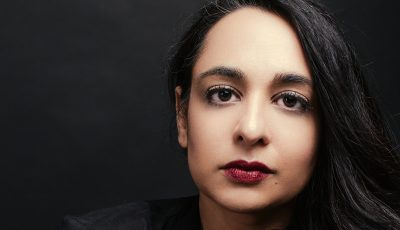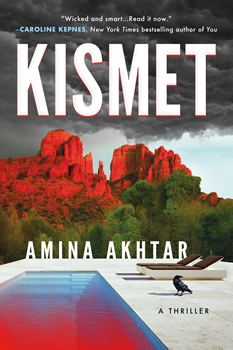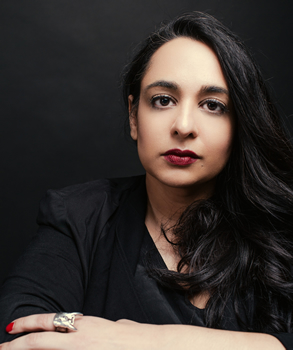

On the Cover: Amina Akhtar
All Is Not Well in Wellness Town
 By Dawn Ius
By Dawn Ius
Between Instagram influencers, TikTok phenomenons, and the latest celebrity pushing their “new” products on you, some fairly ridiculous wellness trends have recently made the leap from fringe theory to health gospel.
And in an industry worth billions of dollars—with little sign of slowing—one only has to “follow the money” to find the potentially deadly consequences of these trends….and that is ripe ground for a thriller writer. Certainly, it provided the backdrop of Amina Akhtar’s “viciously funny” new release, KISMET.
In it, Ronnie Khan trades her comfortable, if not somewhat sedentary, lifestyle in New York for a wellness journey in Sedona, Arizona, after meeting Marley Dewhurt, a socialite wellness visionary who promises Ronnie the opportunity to find her “best self.” At first, Ronnie is seduced by the healing yoga, the epic juice cleanses, the transcendent hikes—but when glam gurus around town start turning up murdered, Ronnie realizes her “best self” needs to learn less about wellness—and more about survival.
In this interview with The Big Thrill, Akhtar speaks frankly about why KISMET doesn’t shy from controversy—and why everyone will be talking about ravens after reading her thriller.
Given your background as a fashion editor, it’s probably not a stretch to assume your debut novel, Fashion Victim, was inspired by the day job. KISMET, though not inspired by fashion so much, resides very much in that same domain. I’d love to hear more about what sparked this story.
I moved to the Sedona area (about 20 miles away) in 2016 to take care of my father. It seemed silly to waste this beautiful setting and not write something.
We’ll get more into the meat of the book in a second, but from the opening pages, I was so hooked by your voice—the humor, the banter, the wit. It’s addictive. How did Ronnie emerge as your protagonist?
I wanted a character who would be swayed by a svengoolie, a cult leader type, like Marley. And I thought back to when I was 18 and moved to NYC in the mid-’90s and how out of place I felt with everyone being so much more sophisticated than I. I wanted Ronnie to feel that same way.
KISMET takes a poke at the influencer and wellness culture that permeates our society. I love the line from your jacket copy, “All is not well in wellness town.” Aside from a propulsive read, what do you hope readers take away from this story?
Wellness is a billion-dollar industry now. It’s become less about healing and more about sales. I think we—and I lump myself in because I’m into wellness too!—need to be more cognizant of the harm our practices are doing to others.
Why do you think this industry continues to boom—and why is it so ripe for a thriller?
I think a large part is that women have been so forgotten by our healthcare industry. And that’s doubly so for Black and brown women. Our aches and illnesses aren’t taken seriously. I’ve been there, I have chronic migraines, and I’ve had doctors not believe me for years. It makes sense that we turn to wellness when everyone else has failed us. Wellness gives us a sense of control over our lives, like we’re doing everything we can to be happy and healthy.
Throughout the novel, Ronnie is frequently the target of racist micro-aggressions. How much of that is a result of your personal experiences?
All of it. I always try to include things from my personal life in that regard because if I have to hear racist nonsense, I may as well do something with it. I know it makes people uncomfortable to read, but imagine how it feels when people say that sort of thing to us.
Can we please talk about the ravens? They have such a vital role in KISMET (even their own points of view)! Can you talk about their significance to you/the story?
So where I live is on a mountain, and we see wildlife more than humans. The ravens are a huge presence here. And while I was writing the book and trying to think of a way to incorporate nature—which is the big draw to coming out here for people—a raven left me a feather. I still have it.
I read that although you always knew you wanted to be a writer, your path to publication wasn’t smooth. How did you find your way from the magazine industry to the book world?
Well, I think I always saw novel authors as the ones who got MFAs and did creative writing, and my path was more to journalism because I wanted to make a living. I think when you’re from an immigrant family, the need to have paying work built into your dreams is key. But once I left fashion, I went full-on into writing, and I love it.
What can you share about what you’re working on now?
My next book is based on the folklore and superstition of my family and looks at a woman who might be haunted, but she doesn’t believe it because her entire thing is to be assimilated in white American culture.
- On the Cover: Alisa Lynn Valdés - March 31, 2023
- On the Cover: Melissa Cassera - March 31, 2023
- Behind the Scenes: From Book to Netflix - March 31, 2023

